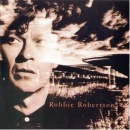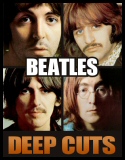Music Home / Entertainment Channel / Bullz-Eye Home
 Buy your copy from Amazon.com
Buy your copy from Amazon.com
| Robbie Robertson: Robbie Robertson Released: 1987 |
As a member and major creative component of the Band, Robbie Robertson went, in roughly a decade, from backing Bob Dylan to having none other than Martin Scorsese direct a documentary about the group’s final shows; clearly, to say that expectations were high for his inevitable solo career would be something of an understatement. Less than eager to stand in the Band’s long shadow – not to mention, as he once famously joked, unsure of whether he even had anything to say – Robertson took over a decade to release an album in his own name.
In the interim, the Band’s dark, creaky-jointed, quintessentially American style was co-opted (and, some would say, expanded upon) by a number of younger artists – including Daniel Lanois, who, fittingly, was tapped to produce Robertson’s solo debut. The entire album ended up being a guest-friendly affair, featuring such obvious Band acolytes as U2, the BoDeans, and Maria McKee, along with Peter Gabriel, Garth Hudson, and well-known session players including Terry Bozzio, Larry Klein, Manu Katché, and Abraham Laboriel. In terms of promotional dollars, Robbie Robertson was one of Geffen’s biggest releases in 1987; the thinking seemed to be that, with enough big names above the marquee, record buyers who had forgotten Robertson – or never been properly introduced to him – might be able to suss out the deep impact he’d had on rock & roll.
It didn’t really turn out that way – the album was certified gold, a year after its release – but not for lack of effort. Robbie Robertson is a sweeping, painstakingly crafted collection, a series of panoramic, sepia-tinted soundscapes with dusty, portentous titles like “Fallen Angel,” “Broken Arrow,” and “Testimony.” That it sacrifices the warmth, empathy, and intimacy of Robertson’s greatest work with the Band in favor of a meticulously layered, big-budget ‘80s facsimile – and misses greatness in the process – is perhaps not only a matter of course, but a function of the era in which it was made.
It wasn’t just the decade’s fault, though. Robertson, charitably speaking, isn’t really a singer. There were good reasons for his overwhelming lack of lead vocals on the Band’s albums; chief among them may have been the heartbreaking voices of Richard Manuel, Rick Danko, and Levon Helm, but even without unfair comparisons, Robertson’s vocal instrument is perhaps best described as limited. It works in the context of these songs, partly because it’s frequently buffeted by stronger voices – Gabriel’s soaring vocals on the chorus of “Fallen Angel” is a perfect example – but also, ironically, because these songs lack their predecessors’ emotional impact. Even when speaking in the first person, Robertson’s protagonists here come across as mere storytellers, detached, above the fray; it certainly contributes to the album’s pleasantly ethereal feeling, but often prevents the songs from being more than they are.
It’s to his credit, though – and perhaps the most important thing about the album – that Robertson seems to have an uncommon grasp of his strengths and weaknesses as a singer. The songs, Lanois’ production, and the parade of guests all contribute to lessen the load, and if the end result is occasionally little more than an echo of what came before, it’s still nice to hear.
jeffg@bullz-eye.com






